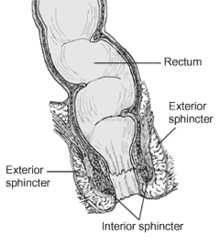- Colorectal surgery
-
Colorectal surgery is a field in medicine, dealing with disorders of the rectum, anus, and colon. The field is also known as proctology, but the term is outdated in the more traditional areas of medicine[clarification needed]. The word proctology is derived from the Greek words Proktos, meaning anus or hindparts, and Logos meaning science or study.
Physicians specializing in this field of medicine are called colorectal surgeons or proctologists. In the United States, in order to become colorectal surgeons, these surgical doctors have to complete a general surgery residency, as well as a colorectal surgery fellowship, upon which they are eligible to be certified in their field of expertise by the American Board of Colon and Rectal Surgery or the American Osteopathic Board of Proctology. In other countries, certification to practice proctology is given to surgeons at the end of a 2-3 year subspecialty residency by the country's board of surgery.
Contents
Scope of the specialty
Colorectal surgical disorders include:
- varicosities or swelling, and inflammation of veins in the rectum and anus (Hemorrhoids)
- unnatural cracks or tears in the anus (Anal fissures)
- abnormal connections or passageways between the rectum or other anorectal area to the skin surface (Fistulas)
- severe constipation conditions
- fecal incontinence
- protrusion of the walls of the rectum through the anus (Rectal prolapse)
- birth defects such as the imperforate anus
- treatment of severe colic disorders, such as Crohn's disease
- cancer of the colon and rectum (Colorectal cancer)
- repositioning of the rectal area if fallen out.
- anal cancer (rare)
- any injuries to the anus
- removal of objects deliberately inserted into anus
Surgical treatment and diagnostic procedures
Surgical forms of treatment for these conditions include: colectomy, ileo/colostomy, polypectomy, strictureplasty, hemorrhoidectomy (in severe cases of hemorrhoids), anoplasty, and more depending on the condition the patient suffers from. Diagnostic procedures, such as a colonoscopy, are very important in colorectal surgery, as they can tell the physician what type of diagnosis should be given and what procedure should be done to correct the condition. Other diagnostic procedures used by colorectal surgeons include: proctoscopy, defecating proctography, sigmoidoscopy. In recent times, the laparoscopic method of surgery has seen a surge of popularity, due to its lower risks, decreased recovery time, and smaller, more precise incisions achieved by using laparoscopic instruments.
See also
- The proctoscope (an instrument for visualizing the rectum)
- The sigmoidoscope (an instrument for visualizing the rectum and sigmoid colon)
- Enhanced Recovery
External links
- Anal Fissure Diagram
- American Board of Colon and Rectal Surgery
- American Osteopathic Board of Proctology.
- American Society of Colon and Rectal Surgeons
Categories:- Proctology
- Rectum
- Medicine stubs
Wikimedia Foundation. 2010.

